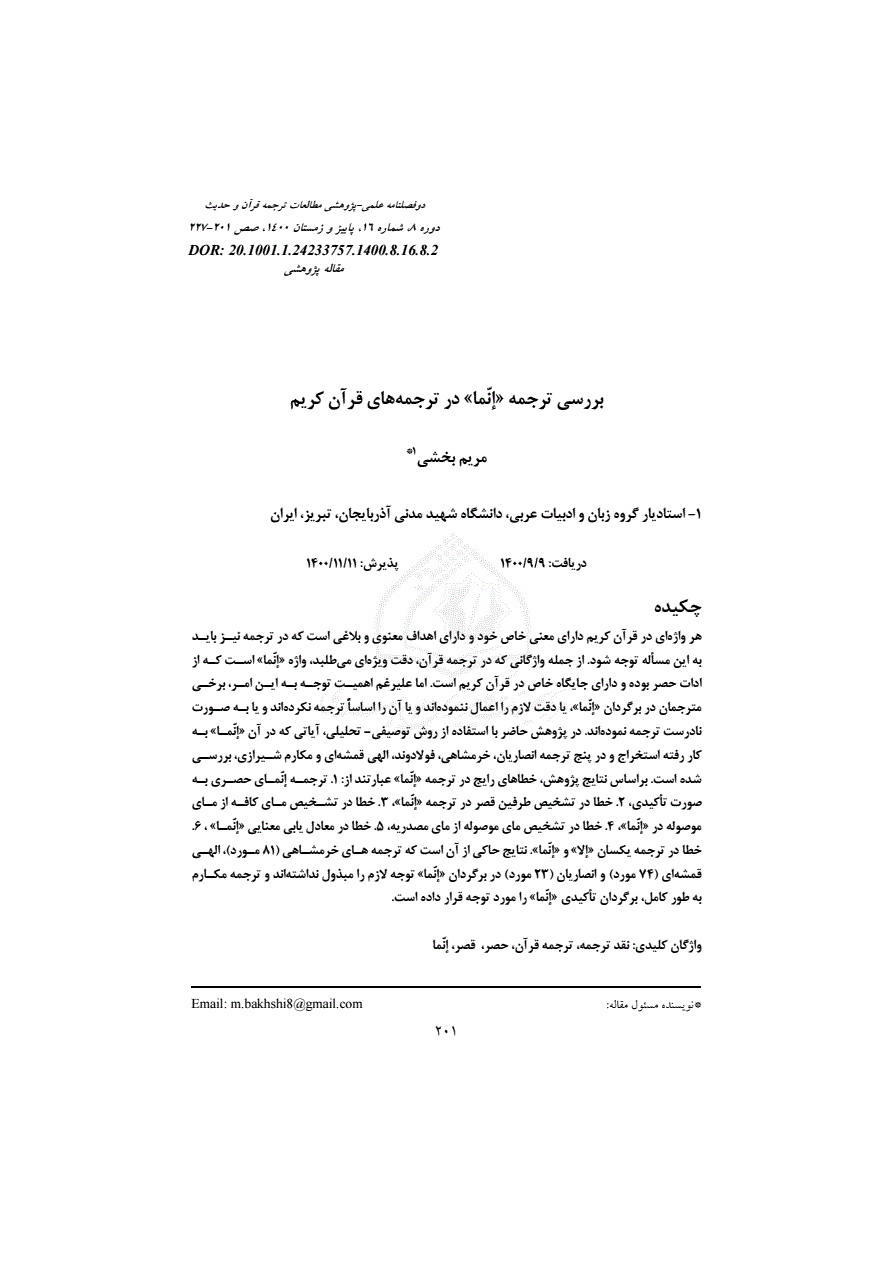Abstract:
هر واژهای در قرآن کریم دارای معنی خاص خود و دارای اهداف معنوی و بلاغی است که در ترجمه نیز باید به این مسأله توجه شود. از جمله واژگانی که در ترجمه قرآن، دقت ویژهای میطلبد، واژه «إنّما» است که از ادات حصر بوده و دارای جایگاه خاص در قرآن کریم است. اما علیرغم اهمیت توجه به این امر، برخی مترجمان در برگردان «إنّما»، یا دقت لازم را اعمال ننمودهاند و یا آن را اساساً ترجمه نکردهاند و یا به صورت نادرست ترجمه نمودهاند. در پژوهش حاضر با استفاده از روش توصیفی- تحلیلی، آیاتی که در آن «إنّما» به کار رفته استخراج و در پنج ترجمه انصاریان، خرمشاهی، فولادوند، الهی قمشهای و مکارم شیرازی، بررسی شده است. براساس نتایج پژوهش، خطاهای رایج در ترجمه «إنّما» عبارتند از: 1. ترجمه إنّمای حصری به صورت تأکیدی، 2. خطا در تشخیص طرفین قصر در ترجمه «إنّما»، 3. خطا در تشخیص مای کافه از مای موصوله در «إنّما»، 4. خطا در تشخیص مای موصوله از مای مصدریه، 5. خطا در معادل یابی معنایی «إنّما» ، 6. خطا در ترجمه یکسان «إلا» و «إنّما». نتایج حاکی از آن است که ترجمه های خرمشاهی (81 مورد)، الهی قمشهای (74 مورد) و انصاریان (23 مورد) در برگردان «إنّما» توجه لازم را مبذول نداشتهاند و ترجمه مکارم به طور کامل، برگردان تأکیدی «إنّما» را مورد توجه قرار داده است.
Every word in the Holy Quran has its own meaning and has spiritual and rhetorical purposes, which should be considered in translation as well. One of the words that requires special attention in the translation of the Qur'an is the word "Innama", which is one of the Bounds and has a special place in the Holy Qur'an. However, despite the importance of paying attention to this matter, some translators have either not exercised the necessary care in translating "Innama", or have not translated it fundamentally, or have translated it incorrectly. In the present study, using a descriptive-analytical method, the verses in which "Innama" is used are extracted and studied in the translations of five translators (Ansarian, Khorramshahi, Fooladvand, Ghomshei and Makarem Shirazi). According to the results of the research, Common errors in the translation of "Innama" are: 1. Translation of the word "انما" emphatically, 2. Error in distinguishing the elements of Bound (Bouned and Bound into), 3. Error in distinguishing the Redundant "ma” from the private in "Innama", 4. The error in distinguishing the consonantal ma from the infinitive" ma”, 5. Error in finding the semantic equivalent of "Innama", 6. Error in the same translation of "ella" and "Innama". The results indicate that the translations of Khorramshahi (81 cases), Elahi Ghomshei (74 cases) and Ansarian (23 cases) did not pay the necessary attention to the translation of "Innama" and Makarem's translation has paid full attention to the emphatic translation of "Inna".

(پژوهیار,
,
,
)

